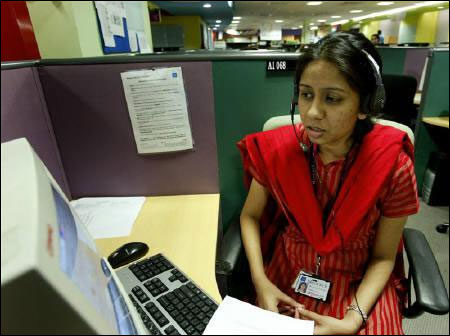Photographs: Reuters
The "double burden" of holding a job and looking after the family is the greatest obstacle preventing women in India from moving up the corporate ladder, a report by management consultancy McKinsey & Company said.
In India, Korea and Japan, almost fifty per cent of those surveyed believed that family commitments were the primary reason for women leaving the jobs, said the report 'Women Matter: An Asian Perspective'.
About 45 per cent of survey respondents in India said the "double burden" influences most or many senior women to leave the workplace (compared with Asian average of 28 per cent).
In Australia, China, Hong Kong, and Singapore, family duties appear to exert less influence.
The report further found out that around 50 per cent of graduates in Asia are women, but only a fraction make it to the middle management, let alone the top.
On average, women account for 6 per cent of seats on corporate boards, and 8 per cent on executive committees.
Click on NEXT for more...
What stops Indian women from moving up the corporate ladder
Photographs: Sherwin Crasto/Reuters
That is strikingly low compared with Europe and United States, where the comparative figures -- though still low -- are 17 per cent and 10 per cent, and 15 per cent and 14 per cent, respectively.
The study found that despite the low representation of women at senior levels, gender diversity is not yet high on the strategic agenda of most Asian companies, and few senior managers believe this will change anytime soon.
If more women are to reach senior positions, they have to be present in the pipeline that feeds those positions, yet in some markets, relatively few women even enter the pipeline, as the rates of female participation in the labour force are low.
In India, for example, the female labour participation rate is 35 per cent, one of the lowest in the world, it said.
"Even when women do enter the corporate world, they often fail to progress very far, either getting stuck in the pipeline early in their careers or deciding to leave at middle management. China, for example, has one of the world's highest female labour participation rates, but still only 8 per cent of corporate board members and 9 per cent of executive committee members are women," said Jin Wang, co-author of the report and Partner in McKinsey's Shanghai Office.
Click on NEXT for more...
What stops Indian women from moving up the corporate ladder
Photographs: Jason Lee/Reuters
Given that women now account for 50 per cent of Asia's graduate cohort, and 57 per cent in Australia, Malaysia, and Indonesia, that amounts to a considerable waste of talent.
Further, in India, low female literacy rates (62 per cent versus 85 per cent for males), affect the number of women entering higher education.
In the 2009-10, only 10 to 15 per cent of students admitted to the Indian Institute of Management were female.
The McKinsey Global Institute, in its latest research, has projected that by 2020 the likely high skill gap in China will be 23 million, while in India the medium skill gap could be to the order of 13 million.
Bringing more women into the workforce would help bridge those skill gaps, it opined.
"There is a clear business case for enhancing women's participation rates at all levels of the work force, and particularly at senior management levels. As Asian companies compete in a globalised market place, companies who don't work to improve women's participation are surrendering two important sources of competitive advantage: having the best talent in an age of talent scarcity, and the particular performance benefits that women in leadership positions bring to an organisation," said Wang.




article